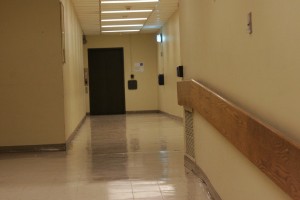
Drue Sokol, Photo Editor
Several weeks ago, graffiti reading “Zionism is terrorism and imperialism” appeared in the tunnels. Later, the word Zionism was crossed out and replaced by the word Islam.
In the Mar. 29 op-ed, “Tunnel graffii sends a disrespectful message,” the Israel Council responded: “The graffiti used provocative and hateful language to express anti-Israel views, offending many on campus and misrepresenting Zionism … Such sentiments have fostered hatred and misunderstanding … Zionism is a nationalist movement, Islam is a religion and neither should be crudely generalized or labeled as terrorism or imperialism.” I will not try to argue that the graffiti was not offensive. Rather, my point is to demonstrate that its being offensive does not make it hateful or wrong.
The striking out of “Zionism” and its replacement by “Islam” demonstrates a deep conceptual confusion (and, frankly, an embarrassing one for a university) about the difference between a religion and a political ideology. Zionism is a form of Jewish nationalism. As a political persuasion, it is not in the same category as Islam or Judaism.
Calling a religion terrorism and imperialism may be distasteful, but it is not wrong simply because it’s offensive to its practitioners. It’s wrong because it doesn’t make any sense. No religion has a unified political or social agenda.
Criticism of nationalism, on the other hand, is not only not wrong; it is necessary. As a political ideology with political goals, nationalism is often dangerous. Remember World War I? It was a clear demonstration of how nationalist ideologies helped exacerbate socioeconomic tensions in Europe that led to the first modern carnage. Nationalism has been an exclusionary mechanism that has driven people to kill one another ever since.
Since Zionism is a form of nationalism, is there any reason it should not be criticized? Israel Council claims that there isn’t by invoking a sanitized definition of Zionism as “the desire of the Jewish people to have a homeland in the Land of Israel and to be able to live there peacefully.”
First, this definition is completely depoliticized while Zionism is nothing but political. Second, it assumes that a huge mass of people could have the same desire. Third, it assumes that if such a desire existed it would be expressed in the political ideology of Zionism. This definition is focused on the ideal spirit of the movement, whereas the graffiti in the tunnels was speaking out about its methods. Both imperialism and terrorism are means of acquiring and manipulating power. Zionism is not a desire; it is certain people’s desires manifested in politics, carried out by particular means.
Attacking someone’s beliefs is quite different from attacking someone as a person. It is a sign of a healthy democratic culture when people’s beliefs are questioned, for it is under the guise of inalienable beliefs that some of the most ruthless political projects are undertaken. Your beliefs are not and should not be immune to criticism; only your right to hold and express them is protected by laws.
So, what’s really happening here? The tacit implication of Israel Council’s article and other responses to the graffiti is that it was aimed at offending Jews and is therefore wrong. The argument being made is analogous to saying that criticism of the Bush Administration’s invasion of Iraq is meant to offend Americans. Perhaps some Americans would be offended by these critiques just as some Jews are bound to be offended by a critique of Zionism. But these criticisms remain targeted at political issues, not at individuals and their racial, confessional or ethnic identities.
Let’s not kid ourselves. The graffitti in the tunnels was not hate speech against any group of students. No one was singled out to be personally insulted through racial or ethnic slurs. Something a bunch of people around here happen to like was criticized in a provocative manner which triggered a flurry of discussion. That’s good. That’s healthy. And no, that’s not anti-semitic.
Dukmasova is a member of the class of 2012.




